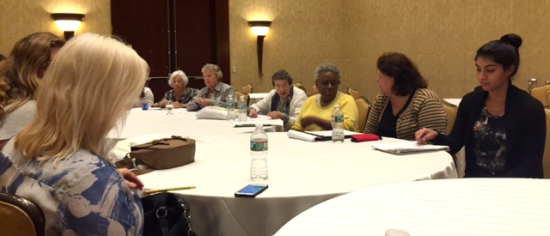
In late October, we attended the Senior Agenda Coalition of Rhode Island’s Ninth Annual Senior Conference in Warwick. The theme was “Aging in Community: What’s Next?” We met older adults in their 60s, 70s, 80s and 90s who were engaged and determined to age with dignity, but unprepared or unclear on how best to do that in the current health care system. A few of the sessions we attended:
- “Aging Fully: Quality of Life in Our Last Stage” facilitated a deep and meaningful conversation, exploring thoughts, feelings and ideas through the posing of questions. Are we aware of being mortal? How do you manage losses? How do you keep your daily life interesting? How do you nurture your soul? However, when the presenter read the last question, there was a silence in the room – “How do you want the end of your life to be?” It is not an easy decision and it is certainly not an easy conversation for many of us to initiate with loved ones. But to increase the likelihood of having our end-of-life preferences honored in varied circumstances, we need to have this difficult conversation with our family, close friends and our health care providers.
- “Healthy Aging Data Report for Rhode Island.” The report, which was funded by Tufts Health Plan Foundation and researched by The Gerontology Institute at the University of Massachusetts Boston, found that Rhode Island has the highest proportion in the country of adults age 85 and older. The localized data in this report provides a great tool to help guide program and policy decisions at the community level to benefit older adults.
- “Aging in Community,” facilitated by the Rhode Island Organizing Project (RIOP), was a session in the format of the house meetings RIOP holds in the community, gathering small groups of older adult consumers and listening to their experiences with the health care system. Again, questions were posed for discussion: What does it mean to age with dignity? And what is needed to help elders remain in their homes and communities? Responses ranged from setting up age-friendly communities to the importance of maintaining opportunities for socialization as we age.
 On our drive home, we reflected on the personal stories we had heard, and the challenges of aging in today’s society. The key messages: people do not want to grow old alone or in a nursing home; they hope to spend their later years in supportive and healthy communities that provide opportunities to remain happy, healthy and independent for as long as is possible.
On our drive home, we reflected on the personal stories we had heard, and the challenges of aging in today’s society. The key messages: people do not want to grow old alone or in a nursing home; they hope to spend their later years in supportive and healthy communities that provide opportunities to remain happy, healthy and independent for as long as is possible.
We two agreed that is exactly how we want to grow old.
